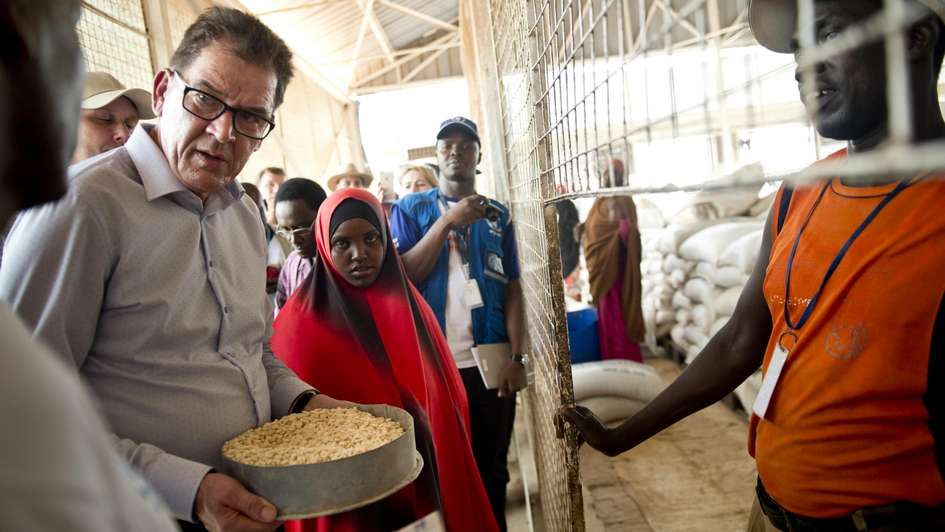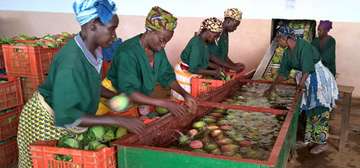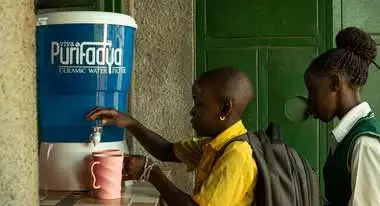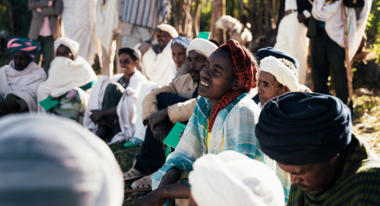Political Governance of the “Special Initiative One World – No Hunger" and What Can be Learnt From It
What is characteristic of the SEWOH initiative launched ten years ago in terms of governance, strategy and political impact in partner countries? A qualitative study explored these questions – and what lessons for development policy can be learnt.

In early February 2014, less than 100 days after taking office, the new Federal Minister for Economic Cooperation and Development, Dr. Gerd Müller, announced a "Special Initiative One World No Hunger" in the Bundestag – the SEWOH (Sonderinitiative EINEWELT ohne Hunger) was born. This Special Initiative was groundbreaking in many respects: it was the first time in the history of the ministry (BMZ – Bundesministerium für wirtschaftliche Zusammenarbeit und Entwicklung) that sectoral (rather than regional) structures were given significant steering authority, and never before had such a large budget been channelled into just one sector – in this case agriculture. Over his two terms of office, i.e. over eight years, the minister succeeded in investing around 12 billion euro (1.5 billion per year) in the global fight against hunger and malnutrition, which is roughly equivalent to the budget for the years 2024 and 2025 of the German federal state of Saarland (one of the smallest and least populous federal states). The portfolio was correspondingly large: In 2019, SEWOH consisted of over 300 projects in 13 priority countries and 15 other countries with a clear focus on Africa.
Following the change in the German government, SEWOH was reorganized in 2022 and converted into the "Special Initiative for the Transformation of Agriculture and Food Systems". In other words, it was closed down in its previous form. A comprehensive impact analysis of SEWOH is still pending. TMG Research has looked at the following questions in a qualitative study (1): What was characteristic of SEWOH; how was SEWOH controlled politically; and what can be learnt for future processes in development cooperation?
The Political Processes of SEWOH
The instrument of a "special initiative" with its own budget allocation was new to the BMZ, even though other special initiatives, such as the "Special Initiative for Stabilization and Development in North Africa, Middle East" quickly followed. SEWOH – by far the most important and largest of these special initiatives – was set up quickly and with great enthusiasm by Federal Minister Müller himself, who had previously served for over eight years as Parliamentary State Secretary (deputy minister) at the Federal Ministry of Food, Agriculture and Consumer Protection (BMELV). As a result, he brought agricultural expertise and a corresponding sectoral perspective to his new role. This was paired with clear values: "Hunger is murder", he told Deutschlandfunk radio in 2019. These aspects, coupled with a family background in agriculture – he described himself as the "son of a small-scale farmer" – led to a manifest desire to take action against this global injustice, especially on the ground. The international political arena was of secondary importance to him.
This influenced how the special initiative was set up: Projects and programs were the main activities, “action was the focus” (2). As Germany had emerged comparatively well from the global financial crisis and the issue of combating hunger had broad support within Chancellor Angela Merkel‘s party, the necessary financial resources were available.
The basis for the successful mobilization of funds required for SEWOH was the Minister's focus on domestic political networks. He formed a broad alliance of stakeholders politically relevant within the country. This included circles who had previously had little contact with traditional development cooperation. For example, Müller invited German manufacturers of agricultural machinery, German manufacturers of fertilizers and agricultural chemicals as well as the German Farmers' Association to help shape SEWOH. And he did this hand in hand with the ministry and traditional players in German development cooperation, the Gesellschaft für Internationale Zusammenarbeit (GIZ – German Corporation for International Cooperation), the Kreditanstalt für Wiederaufbau (KfW – Bank for Reconstruction), but also civil society organizations and church-based implementation structures.

This integration of a wide range of organizations was only possible because SEWOH's project portfolio was broad and thus united a wide variety of approaches under one roof. Interviewees spoke of “a bouquet, basically a mixed bag” (3), or emphasized that “SEWOH's approach was at times not particularly strategic” (4). “The political promise was the ability to innovate. You give things a try and cooperate with stakeholders that could not be reached through alternative, existing instruments.” (5)
At an international political level, SEWOH certainly served as a role model, as SEWOH issues such as hunger, malnutrition and rural development were given renewed political weight: “They're doing something, they're doing more than others – okay, maybe that’s an important issue after all.” (6) SEWOH was a successful “flagship” (7) or “flagship branding” (8) of official German development cooperation from 2014-2022.
The hurdles of SEWOH
This willingness to change, coupled with the necessary resources, was an essential prerequisite for the impact achieved by the initiative. However, there were also some fundamental challenges that the minister encountered or that arose due to the structure and direction of SEWOH.
Agricultural policy expertise at the BMZ
Firstly, the BMZ was no longer well positioned in the agricultural sector at the start of SEWOH in 2014: “The topic [had] actually become more or less irrelevant since the mid-1990s.” (9) This meant that the necessary expertise and human resources had to be built up very quickly, for example to implement the centrally important "Green Innovation Centers" (the target was to establish ten of these centers by the end of 2015) (10). However, “some of the expertise could perhaps have been set up more slowly or over a longer period of time” (11) – which would certainly have helped to embed the issue more firmly in the ministry.
Internal friction
More significant was the fact that, for the first time in the history of the BMZ, sectoral structures were given direct authority for implementation. Historically, “de facto authority to shape country-related bilateral cooperation" (12) lies with the BMZ's regional division, while sectoral structures are responsible for the required “conceptual design and content” (13). SEWOH swiftly and radically changed this traditional division of assignments, leading to “internal friction in the German system” (14). To be truly sustainable in the long term, such a reorganization of budget allocations would probably also have required a corresponding restructuring within the ministry. Müller, however, wanted to see concrete results in partner countries quickly, so he took a “shortcut” (15) and avoided restructuring, which would have been laborious and time-consuming.
The Results of SEWOH
The results are ambivalent: Projects to combat hunger were implemented quickly and successfully in the regions and at a local level. However, the truism that projects very rarely fail, but are also very rarely transferred successfully ("projects never fail, projects never scale" (16)), was confirmed in the SEWOH context. In some partner countries, SEWOH projects were perceived [...] “like a spaceship from an alien star that landed in a particular country and dropped a lot of money somewhere, but often outside the regular portfolio framework and with insufficient consultation and poor coordination” (17). The constant struggle for influence and resources between the regional and sectoral divisions of the BMZ was also due to the fact that “SEWOH was seen as a rival in budget allocation” (18). By effectively ignoring this fault line, ministry management was able to set up SEWOH quickly and on a substantial scale, but also prevented the initiative from realizing its full potential, for “development cooperation, whether viewed from a regional or sectoral perspective, requires an all-inclusive approach” (19).
Focus on Programs and Projects
From the outset, SEWOH was conceived as a multi-actor initiative; a large number of different participants were to (be able to) contribute their respective strengths to the broad scope of the initiative. However, this led to the aforementioned focus on action, projects and visibility (both in domestic politics and with regard to other donors) – and less on potentially difficult processes of political negotiation. The focus was on “operational implementation rather than approaching the issue on a somewhat more fundamental, political level” (20).
This approach had various advantages, such as the involvement of a broad spectrum of expertise, the generation of political support within Germany and – as a result of this – the mobilization of resources. This method corresponds to the "classic way" of German development cooperation, “the German approach [...] of experimenting at the micro level (through projects) and then to sum up results (politically) at the meso and, above all, macro level” (21).
On the other hand, no attempt was made by SEWOH to contribute to a political transformation of the food system in partner countries and at the global level, to bring about truly systemic change: A “concurrent political dialog [...] to use individual projects as an impulse for change” (22) was missing. The longer SEWOH lasted, the more challenging the lack of political governance became for participants. In the end, this omission became all too glaring at the start of procedures leading to the United Nations Food Systems Summit 2021.
Transformation of food systems is a political process, and while German development policy had taken the financial lead within the donor community, it had not taken the political lead. The focus on projects and programs has supported many successful projects in partner countries and provided useful impulses, but a lasting transformation of such initiatives into structures and processes – and thus a systemic change in food systems – was neither sought nor achieved.
Mixed political results
It is to SEWOH's credit that it has returned the issues of hunger, malnutrition and rural development to the international political stage. However, it has been less successful in entrenching SEWOH projects in the long term, beyond their initial duration, or in turning them into processes for transforming agricultural and food systems in partner countries. During the time of its existence, SEWOH was able to make a significant political impact, above all in the context of the German G7 presidency. This led to the so-called Elmau Declaration announced in 2015, with the aim of freeing 500 million people from hunger by 2030. However, this target falls far short of expectations. In fact, there are realistic fears that there will be no improvement in hunger figures between 2015 and 2030 (23). As significant as the Elmau Declaration was at a political level, it only resulted in very limited changes at an operational level. Furthermore, SEWOH had a very limited transformative effect – it did little to contribute to a profound structural change. This would have required not only financial incentives but also strategic political initiatives.
Conclusion: Lessons learned from SEWOH
“To take on a leadership role, you need a strategy. Clarity is required in the goals you set yourself” (25) – and apart from the overarching goal of combating hunger, these remained unclear in significant parts of SEWOH. At the political level, “it has unfortunately not been possible to initiate a political rethinking in agricultural policy in the main SEWOH partner countries”. (26)To achieve this, “the issues [...] should have played a more central role in the political dialog with partner countries” (27).
One conclusion to be drawn from this is that in the area of combating hunger, malnutrition and in rural development, development cooperation needs to be more political. This could mean investing in longer-term, riskier processes of political transformation, for example in the area of “institution building”, and less in projects with clearly defined goals and of limited duration. This requires continuous political dialog, openness and trust – quite a challenge given a changing development environment with shrinking budgets (28) and a multitude of crises (4Cs) (29) in a multipolar world where many partner countries have a choice of cooperation partners.


(1) 18 leading experts were interviewed. Their statements are quoted in cursive in the text.
(2) Alexander Müller, TMG
(3) Michael Windfuhr, DIMR
(4) Mathias Mogge, Welthungerhilfe
(5) Hendrik Denker, BMZ
(6) Ibid.
(7) Dr. Leonard Mizzi
(8) Mathias Mogge, Welthungerhilfe
(9) Hendrik Denker, BMZ
(10) Dr. Stefan Schmitz, Crop Trust (formerly BMZ)
(11) Michael Windfuhr, DIMR
(12) Dr. Stefan Schmitz, Crop Trust (formerly BMZ)
(13) Ibid.
(14) Ibid.
(15) Michael Windfuhr, DIMR
(16) Wie Transformationen und gesellschaftliche (umweltbundesamt.de)
(17) Hendrik Denker, BMZ
(18) Dr. Michael Brüntrup, IDOS
(19) Dr. Andreas Quiring, Andreas Hermes Akademie
(20) Mathias Mogge, Welthungerhilfe
(21) Michael Brüntrup, IDOS
(22) Michael Windfuhr, DIMR
(23) „Projections show that by that time, approximately 600 million people will be hungry – 7% of the world’s population. This will be the same proportion as in 2015 and there will be no progress on SDG2.“ UN Secretary-General Call to Action (unfoodsystemshub.org)
(25) Michael Windfuhr, DIMR
(26) Dr. Stefan Schmitz, Crop Trust (ehemalig BMZ)
(27) Christel Weller-Molongua, GIZ




